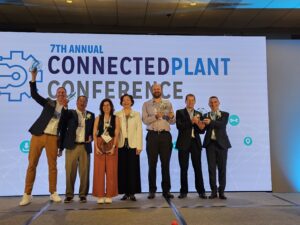A group of individuals and teams were honored for their achievements in furthering the digital transformation in the power generation and chemical process industries (CPI) at the 2023 Connected Plant Conference (www.connectedplantconference.com) in New Orleans, La. on Sunday.
Chosen by the editors of Chemical Engineering and POWER magazines, the winners of this award are fast risers in the field who, through insight and experience, have contributed to innovation, solved problems, or made extraordinary improvements using digitalization solutions.
 Figure 1. Gamechangers award winners at the Connected Plant Conference in New Orleans
Figure 1. Gamechangers award winners at the Connected Plant Conference in New Orleans
Short descriptions of each of the 2023 Game Changes awardees follow:
Patrick Oglesby, Albemarle. As Albemarle’s senior manufacturing data analytics engineer, Oglesby has worked within Albemarle’s Global Manufacturing Excellence & AI team to automate manual tasks and create new capabilities and solutions that add tremendous value. Oglesby created and designed many parts of the Albemarle Intelligence infrastructure, including identifying clever ways to automate mass generation of event frames and analytics within the AVEVA PI Asset Framework system. These methods and strategies saved Albemarle millions in implementation costs. Patrick’s contributions continue to support and add value to the Albemarle Intelligence program, which is generating estimated improvements in excess of $50 million annually.
Leonid Lev, Ph.D., Hofit Kutai, Ph.D. and Barak Davidovich, Israel Electric Corporation. This team developed a dynamic digital lab in a safe, near-real-time environment that validates both operation and cybersecurity scenarios that cannot be run on a company’s real operation system. This patented system, checks and strengthens both cyber and operation resilience, preparing the company for their next step.
Andrew Tang, Wärtsilä. Andrew Tang has helped Wärtsilä expand its focus on software applications, creating an energy-storage-management software for its customers. Known as GEMS Digital Energy Platform, the software platform monitors, controls and optimizes energy assets on both the site and portfolio level. Using machine learning along with historic and real-time data analytics to optimize the asset mix, GEMS enables customers to remotely monitor, operate, identify and diagnose equipment with unrivaled safety, reliability and flexibility. GEMS’ flexible architecture — dynamically adjusting based on market conditions — addresses a critical need for intelligent and adaptable software.
Penny Chen, Ph.D., and Sandra Fabiano, Yokogawa. Penny Chen is the global leader for Yokogawa’s mobile robotics initiative, as well as a fellow of the International Society of Automation (ISA). Sandra Fabiano was the original architect and now leads the engineering R&D team that developed the Yokogawa Robotics Integration (YoRoI) platform. YoRoI provides a common user interface, data storage for all vendor-robot data, and the ability to use in-house or third-party artificial intelligence services to integrate with industrial automation systems. Developing artificial intelligence helps to meet customer requirements, such as distinguishing between safe and hazardous conditions and detecting anomalies to bring a process back within specifications and avoid lost batches and shutdowns.
Eschbach team (Lukas von Sperl, Daniel Däschle, Christian Matt, Ph.D., Veit Hora, Andreas Eschbach, Anastasia Zhukova and Bela Gipp, Ph.D.). This team from Eschbach developed an effective and efficient search functionality based on AI that looked to solve two challenges cited by their client, Bayer: 1. Inefficient access to documented historical knowledge captured by Eschbach’s Shiftconnector software; and 2. Incomplete entry items where often descriptions of solutions to problems in the production process were missing or incompletely described. The development AI’s Smart Search functionality solved both problems. Teams have improved plant performance by quickly finding solutions based on the history of documented “tribal knowledge” from the plant operations teams. By retrieving the most relevant information, it accelerates operations and brings capabilities to help teams recover from disruptions by immediately identifying appropriate fixes. Also, captured knowledge can be managed to support workforce changes.
James Goosby, Southern Company. Goosby was tapped to lead Southern Company’s newly created Office of Business Technology Planning and Strategic Initiatives. The group is responsible for ensuring the strategic business initiatives that require technology to follow a framework that allows for predictable outcomes. He continues to chair the Operations Technology Leadership Team that facilitates strategic business technology planning and implementation, while ensuring alignment to business priorities. This year, Goosby was also named the executive-in-residence at the McCrary Institute for Cyber and Critical Infrastructure Security at Auburn University. In this position, he will be in a strategic role to lead not only Southern Company in Cyber and Critical Infrastructure Security but also help other organizations work on technology adoption goals while addressing cybersecurity.